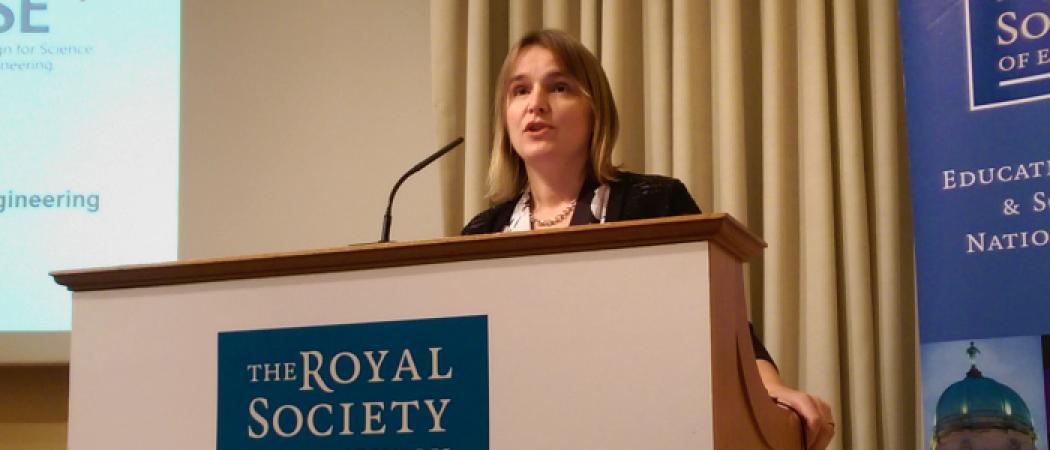Investment and jobs in research have been hit by COVID-19. It’s time to assess the damage and prioritise for the re-build, says Sarah Main of the Campaign for Science and Engineering

Sarah Main, Executive director of the Campaign for Science and Engineering.
As the UK reached the first anniversary of the initial Covid-19 lockdown on 23 March 2020, it was a day to reflect on the impact the coronavirus pandemic has had on our lives. We have all faced challenges over the year, with the crisis affecting homes and families, businesses and the economy.
There has been particular disruption to R&D-intensive businesses in some sectors - and therefore to UK research and innovation as a whole.
According to the UK Office for National Statistics (ONS), companies account for around 70% of all R&D activity in the country. While some R&D-intensive sectors, notably biopharmaceuticals and internet services, have weathered the COVID-storm, others such as aerospace, automotive and oil and gas, have been hard hit.
The ONS figures show that in 2018, those sectors that have been badly affected by the pandemic accounted for around £6 billion of UK R&D, nearly a quarter of total corporate investment.
Companies in these sectors have suffered from a collapse in demand and unprecedented market conditions, resulting in structural changes and job losses. BP, Shell, Rolls Royce and Airbus all announced cuts to their workforces of between 10% - 20% last year, or 10,000 - 25,000 jobs per company. The Society of Motor Manufacturers and Traders estimates 11,000 UK jobs were cut by carmakers and their supply chains in the six months to July 2020.
While there are uncertainties over the full impact on the wider research effort, CaSE has heard from leading companies that R&D has been scaled back significantly, as they focus on keeping cash in the business. Restoring R&D activity is expected to take years, not months. It seems likely there will be knock-on effects beyond these sectors, for example in the adoption of automation processes in manufacturing in general, or in the pace of cross-sector research programmes, such as in battery technology.
In the midst of this bleak picture come opportunities, as companies re-prioritise and focus on new growth areas. As one example, energy and transport companies are accelerating their ‘green revolution’. These could dove-tail with government priorities such as Net Zero and ‘Building back better’, given the right support.
Conditions for growth
The UK government has set a target of approximately doubling R&D to 2.4% of GDP by 2027. In the face of the apparent blows to R&D in some quarters, and the aim of growing R&D as a whole, it seems wise to assess the state of corporate R&D.
Given this, CaSE has called on the government to consider the value of a business R&D strategy, to provide a much-needed national, coordinated and concerted approach to incentivise and grow corporate R&D in the UK, and provide a platform to help drive recovery and prosperity, on a national and international level.
We were pleased therefore, when the government published ‘Build Back Better: our plan for growth’ earlier this month. This is a welcome step, with ideas on how to drive growth through infrastructure, skills and innovation. In particular, it promises an innovation strategy, to be published in the summer of 2021.
CaSE is actively informing the development of this strategy, and at pace. It is hoped long-standing ideas such as creating a digital shop window to simplify navigation of innovation support will be included, as well as initiatives to ensure resilience of the research and innovation system in the longer term. And the government will need to follow through swiftly from strategy to delivery in order to retain and stimulate business investment and ensure R&D plays a full role in the UK’s economic recovery.
The effects of the COVID-19 pandemic will be long-lasting. Reflecting a year on, we can see the opportunity presented by becoming the best place to conceive, develop and grow next generation technologies. An innovative, future-facing environment such as this could sustain the future of hard-hit businesses and drive the broader economic and health recovery we all want to see. Working together with business and government, CaSE is determined to turn this ambition into a reality.
Sarah Main is the executive director of the Campaign for Science and Engineering, an independent advocacy group representing the sector, including companies, science parks, learned and professional societies, universities and research charities.





 A unique international forum for public research organisations and companies to connect their external engagement with strategic interests around their R&D system.
A unique international forum for public research organisations and companies to connect their external engagement with strategic interests around their R&D system.